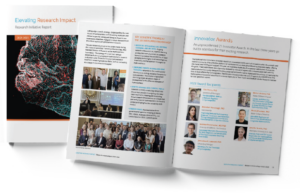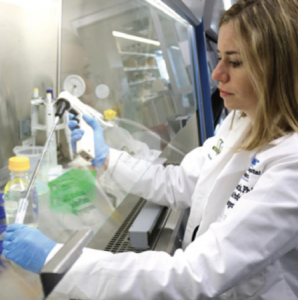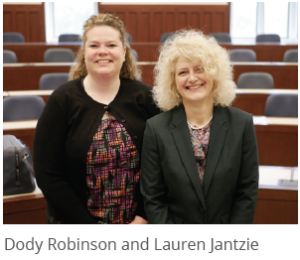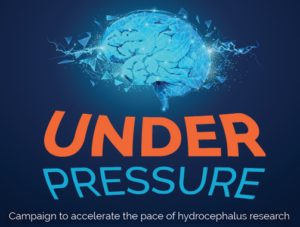Elevating Research Impact: 2021-2023 Research Report
 We are excited to share our 2021-23 Research Report. The report showcases our latest research, revealing significant advancements in understanding the causes of hydrocephalus, enhancing care, and developing treatments for hydrocephalus.
We are excited to share our 2021-23 Research Report. The report showcases our latest research, revealing significant advancements in understanding the causes of hydrocephalus, enhancing care, and developing treatments for hydrocephalus.
Research Report Highlights
- Overview of our Research Networks (AHCRN, HCRN, HANDS, and HAPPIER)
- Return on Investment of research funding
- Featuring funded scientists’ successes
- Community Research Priorities
- Research Strategic Plan
- HA Rudi Schulte Research Institute (RSRI)Annual Research Workshops
- Innovator Award Recipients
- New National Director of Research
Download Our Latest Research Report
2021-2023 Research Report
PRMRP CDMRP Awarded $11.7 Million to Hydrocephalus Research in 2023
 Since 2015, hydrocephalus has been eligible to receive funding through the Peer Reviewed Medical Research Program (PRMRP) within the Department of Defense’s Congressionally Directed Medical Research Program (CDMRP).
Since 2015, hydrocephalus has been eligible to receive funding through the Peer Reviewed Medical Research Program (PRMRP) within the Department of Defense’s Congressionally Directed Medical Research Program (CDMRP).
The PRMRP funds research with the potential to further the development and implementation of medical devices, drugs, and clinical practice guidelines to improve diagnosis and treatment in healthcare settings. The goal is to accelerate research that will advance care, improvements, and breakthroughs.
The FY2023 funding total of $11.7M from the PRMRP marks another multi-million dollar funding year for hydrocephalus-related research within the program. This large amount awarded demonstrates the quality and caliber of research being put forward by the scientific community.
FY2023 Award Recipients
Cerulean Scientific (formerly FreeFlow Medical Devices)
Awarded the Technology/Therapeutic Development Award to fund the finalization of a coating that will prevent the growth of cells on shunt tubing in the brain and ultimately decrease shunt revisions.
Maria Garcia Bonilla
Awarded the Discovery Award to study ependymal cell dysfunction and the root causes of hydrocephalus.
Carolyn Harris
Awarded the Discovery Award and aims to reduce shunt failure by targeting specific biological mechanisms of the cells that attach and grow in the shunt lumen and in the shunt catheter holes that cause shunt obstruction and failure.
Senseer Health
Awarded the Technology/Therapeutic Development Award to fund the finalization of an internal monitor that works with a shunt to capture information about an individual’s intracranial pressure and CSF flow.
The SCEMPI Clinical Trial for Preterm Infants
 The Safety of Combined Therapy with Erythropoietin& Melatonin for Preterm Infants with Intraventricular Hemorrhage (SCEMPI)has now launched and is currently enrolling participants. Drs. Shenandoah Robinson and Lauren Jantzie of Johns Hopkins are leading SCEMPI trial, a blinded, randomized, controlled research study to test whether high-dose melatonin and erythropoietin (EPO) are safe when given together to very preterm infants with severe intraventricular hemorrhage (IVH). The objectives of this study are safety during the neonatal admission and evaluating the rates of other common comorbidities of very preterm infants with severe IVH. Babies who were born between 23-0/7 and31-6/7 weeks of gestation, are less than 21 days old, and have severe (at least unilateral grade III) IVH on their head ultrasound within five days are eligible to participate in this study.
The Safety of Combined Therapy with Erythropoietin& Melatonin for Preterm Infants with Intraventricular Hemorrhage (SCEMPI)has now launched and is currently enrolling participants. Drs. Shenandoah Robinson and Lauren Jantzie of Johns Hopkins are leading SCEMPI trial, a blinded, randomized, controlled research study to test whether high-dose melatonin and erythropoietin (EPO) are safe when given together to very preterm infants with severe intraventricular hemorrhage (IVH). The objectives of this study are safety during the neonatal admission and evaluating the rates of other common comorbidities of very preterm infants with severe IVH. Babies who were born between 23-0/7 and31-6/7 weeks of gestation, are less than 21 days old, and have severe (at least unilateral grade III) IVH on their head ultrasound within five days are eligible to participate in this study.
High-dose enteral melatonin will be given up to 34 weeks in the study, and EPO will also be given up to 34 weeks. Safety will be monitored during treatment and after. The first group of babies will be treated open label and the second group will be randomized 3:1 to treatment versus placebo. All study participants including physicians and staff will be blinded to the treatment group except the research pharmacy. This study is funded by NIH NICDH and the Johns Hopkins Children’s Center.
Record-Breaking $14 Million Grant for iNPH Clinical Trial in Full Swing

Groundbreaking research in idiopathic normal pressure hydrocephalus (iNPH) is well underway thanks to a $14M grant, the largest grant ever awarded to study adult hydrocephalus, funded by the National Institute of Neurological Disorders and Stroke (NINDS) of the National Institutes of Health (NIH). The grant was awarded to the Adult Hydrocephalus Clinical Research Network (AHCRN) to conduct the first large-scale, multi-center, blinded, randomized, controlled trial aimed at evaluating the true response of shunting in patients with iNPH and identifying factors that improve diagnosis.

The study, titled “A Placebo Controlled Efficacy in idiopathic Normal Pressure Hydrocephalus Shunting (PENS)”, is being conducted at 21 centers located in the US, Canada, and Sweden. The lead site is the Johns Hopkins Cerebral Fluid Center, with Dr. Mark Luciano serving as the principal investigator.
To date, 61 participants have been randomized for the trial. The study aims to include a total of 100 participants, and recruitment will continue until this target is met, expected to be around March 2025. Results from the trial are anticipated to be reported by the end of 2026.
The AHCRN, comprised of eight member institutions, played a pivotal role in identifying the need for this study, leading discussions, and ultimately pursuing it. The AHCRN is one of three research networks funded by the Hydrocephalus Association, dedicated to conducting clinical research to improve treatment for adult forms of hydrocephalus.
Announcing the 2023 Innovator Award Recipients
The Hydrocephalus Association Innovator Awards are a testament to the spirit of innovation within the scientific and medical community. They provide a platform for visionaries to turn their groundbreaking ideas into reality, offering crucial seed funding and support. This year, we received a multitude of exceptional submissions from across the globe. These submissions were rigorously reviewed by a panel of experts who evaluated alignment with the Hydrocephalus Community Research Priorities, potential for transformative impact, and the promise of improving the lives of those affected by hydrocephalus.
The Innovator Awards are for one year of support at a $50,000 level. The Hydrocephalus Association would like to extend a thank you to Team Hydro and the Rudi Schulte Research Institute for their generous support. Collectively, we were able to fund seven Innovator Awards.

Tim Cherry, MD
University of Washington
The MicroMRNA, MIR9 as a Network Regulator in Hydrocephalus

Maria Lehtinen, PhD
Boston Children’s Hospital
Cellular and Molecular Characterization of Human and Porcine Choroid Plexus to Study Post-Hemorrhagic Hydrocephalus (PHH)

Mercedeh Movassagh, PhD
Yale University
Improving Neonatal Hydrocephalus Diagnosis, Treatment, and Prevention Through Metagenomics and Genetic Characterization in Ugandan Cohorts

Ronald Parchem, PhD
Baylor College of Medicine
MicroRNA Regulation of Neural Fate Specification in Congenital Hydrocephalus

Andreas Rauschecker, MD, PhD
University of California, San Francisco
Automated Volumetric Measurements for Early Diagnosis and Identification of Fetal Hydrocephalus Requiring Intervention

Jennifer Strahle, PhD
Washington University in St. Louis
Amniotic Fluid and CSF Factors Responsible for Hydrocephalus and Altered Brain Development in Myelomeningocele

Johnathan R. Sukovich, PhD
University of Michigan
Histotripsy for the Treatment of Hydrocephalus
Research Workshop Entitled Developing Non-Invasive Therapies
 More than 60 distinguished professionals gathered in Dallas, TX, for the 2023 Hydrocephalus Association and Rudi Schulte Research Institute (RSRI) Research Workshop Developing Non-Invasive Hydrocephalus Therapies: Molecular and Cellular Targets. This included scientists, educators, engineers, neurologists, neurosurgeons, and patients who came together to explore advancements in non-invasive hydrocephalus treatment research.
More than 60 distinguished professionals gathered in Dallas, TX, for the 2023 Hydrocephalus Association and Rudi Schulte Research Institute (RSRI) Research Workshop Developing Non-Invasive Hydrocephalus Therapies: Molecular and Cellular Targets. This included scientists, educators, engineers, neurologists, neurosurgeons, and patients who came together to explore advancements in non-invasive hydrocephalus treatment research.
The workshop served as a catalyst for knowledge exchange and collaboration during the presentations of cutting-edge scientific findings. Understanding the root causes of hydrocephalus and identifying molecular and cellular targets for therapy will bring us closer to new treatments.
Monica Chau, PhD
National Director of Research, Hydrocephalus Association
“We are immensely proud of the strides made during this research workshop. The synergy of minds from various disciplines fuels our drive for meaningful progress in hydrocephalus research and patient care. There aren’t many hydrocephalus treatment research groups out there, and we are leading the charge in non-invasive therapies.” — Monica Chau, PhD National Director of Research, Hydrocephalus Association
Attendees engaged in robust discussions on the critical aspects of hydrocephalus research, with a focus on the following key areas:
Artificial Intelligence (AI), Machine Learning, and Big Data
Ongoing research endeavors in AI, machine learning, and big data were prominent as scientists learned more about the possibilities of these emerging technologies to enhance diagnosis, treatment, and management strategies for hydrocephalus.
How to Advance into Clinical Trials
Scientists currently conducting clinical trials shared their process in navigating the many steps required in initiating and conducting clinical research. Presentations on clinical trials past and present in hydrocephalus clarified the context and highlighted the remaining work needed.
Emerging Targets in Drug and Gene Therapies
Advances in the preclinical and clinical arenas of drug and gene therapies for hydrocephalus were shared. Presentations highlighted promising targets at various stages of development for the different etiologies of hydrocephalus.
Funders Panel
Representatives from governmental agencies including Jill Morris [National Institutes of Health (NIH) National Institute of Neurological Disorders and Stroke (NINDS)] and PJ Brooks [NIH National Center for Advancing Translational Sciences (NCATS)], and Cecilia Dupecher [Department of Defense Congressionally Directed Medical Research Programs (CDMRP)] spoke about their respective program’s scopes and upcoming funding opportunities.
Under Pressure: A Campaign to Accelerate the Pace of Research
 The majority of the promising research found in the surrounding pages was made possible by private funding from individual donors and foundations, and our corporate partners. The research results have catapulted hydrocephalus into the sphere of interest and ideas from additional disciplines, as noted, which means the number of funding opportunities has grown by leaps and bounds as well.
The majority of the promising research found in the surrounding pages was made possible by private funding from individual donors and foundations, and our corporate partners. The research results have catapulted hydrocephalus into the sphere of interest and ideas from additional disciplines, as noted, which means the number of funding opportunities has grown by leaps and bounds as well.
This is an excellent place for HA and hydrocephalus research, but it is also clear that the funds required for new and continuing research have also grown at a rapid rate. As evidenced by our aptly titled research campaign, we are under pressure to find this funding so that we can maintain this encouraging trajectory. Together, we can change the future of hydrocephalus!
If you currently support HA through one of our fundraisers, like the WALK, or through an individual gift, we ask that you continue to do so, and even consider increasing your investment, even making a second donation specifically for research.
If you have not dipped in your toe yet, please consider making your first gift today, in support of the Under Pressure campaign.
Share your story with family, friends and co-workers… why do you support HA, and won’t they join you? If you know someone who might be interested in investing in hydrocephalus research, we’d love to talk to them.
Under Pressure Campaign Update
We are thrilled to announce that our Under Pressure campaign has raised an impressive $2,187,880 so far! Thank you to everyone who has contributed to making this campaign a success. Your support is making a significant impact in our fight against hydrocephalus.
Please reach out to Linda Riley, National Director of Development at linda@hydroassoc.org.
Or visit hydroassoc.org/underpressure
Together, we can change the future of hydrocephalus, improving the lives of those impacted by hydrocephalus, and ultimately finding a cure

